Members’ Newsletter

September 2025
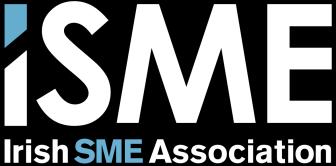




September 2025



Dear member,
We’re only six weeks away from Budget 2026. This will be a really consequential budget for most businesses. While Ireland remains close to full employment, many SMEs are under mounting cost pressures, while trade and revenues remain challenged. Azets research recently confirmed what ISME has seen for some time: debtor days are increasing for many SMEs, and insolvencies are picking up.
Our pre-budget submission covers five essential themes for small businesses:
• The need to control business Costs
• The need to reform Indigenous Enterprise Policy
• The need for Skills and Training among our enterprise base
• The need to control public finances
• The need for adequate levels of affordable housing
While details for employers remain thin on the ground, it is important for you to budget for Auto Enrolment. Government remains adamant that this will commence in January, and it will need to be communicated to employees. You need to ensure when preparing your 2026 budgets that you include 1.5% increase in payroll for those eligible for AE
Since last month, a degree of progress has been made in the EU-US trade deal. However, a 15% tariff remains a serious barrier for the vast majority of businesses trading with the US. This will reduce trade, reduce profitability, hurt consumers and cost jobs in the long run. It also means the Irish government MUST set out a plan to rebalance the economy away from FDI.
We will be watching the budget speeches with interest, especially to see if the government is going to proceed with raiding the National Training Fund. Employers pay about €1bn per year into the NTF, and the money is intended for training and upskilling members of the workforce, or those looking for employment. It is not intended to be spent on putting solar panels on universities. We would view the diversion of training fund money into university spending as a very serious breach of trust with employers. This is employers’ money, intended for spending on the training of employees. Please make sure your local TD understands this.
Another issue of huge importance, especially in the retail sector, is the Defamation Reform Bill. As we said last July, the reform bill does not go far enough, and bringing in a “qualified privilege” defence for retail defamation is a complete waste of time. We want to see the reintroduction of the “transient retail defamation” protection that was promised when the general scheme of amendment was announced for the defamation act. Anything less will not protect retailers.


ISME – A big mistake to plunder the National Training Fund surplus to fund universities
As we approach Budget 2026, set for Tuesday 7th October, ISME is concerned that the Government is considering diverting some of the National Training Fund (NTF) surplus into spending on third-level institutions. In our view, and that of the majority of SME employers throughout Ireland, any such development would be regarded as a serious misjudgement.
Employers provide approximately one billion euro per annum to the NTF via the training levy. In return, the employers can avail of co-funded training opportunities from Skillnet Ireland, which in the current year will disperse about €60m in co-funding, a mere 6% of the total training levy. Because it is co-funded by employers, Skillnet training is efficient, effective, and targeted where there is most need.
If NTF monies are diverted into capital spending in the tertiary education sector in Budget 2026, the fund will be depleted very quickly in a sector that has traditionally shown very poor financial discipline.
ISME is calling for a doubling (at a minimum) of the Skillnet funding in budget 2026. It is farcical that the NTF is allowed run a €1.5bn surplus while employers are restricted in co-funded training. We urgently need to implement the Action Plan for Apprenticeships, and improve innovation, entrepreneurial, financial, digital and export skills in our indigenous enterprise base
Read more here

Bundle & Save- Reach 15,000+ Irish SMEs for just €1,200
Get maximum visibility for your brand with our value-packed advertising offer:
• One 4x8 inch advert on the 2026 ISME Wall planner (used daily by SMEs nationwide)
• 2 x full-page adverts in the upcoming issues of The bISME in 2025 – our quarterly digital business magazine sent to over 15,000+ SME decisionmakers

Email marketing@isme.ie to secure your package and to know more information.

ISME HR Hub – your HR support
To support Members to deal with the everchanging world of HR and employment law, we have created a portal to give you access to guides, templates, contracts, policies and more to support you in managing HR in your business. We have curated the information based on the HR Life Cycle: Attraction, Recruitment, Onboarding, Policies & Training, Performance Management and Exit

You can also find information from government agencies and other third parties in our General Information & Resources page, links to the top downloads and view our selection of blogs including Statutory Sick Pay FAQs and EU Directive on Transparent and Predictable Working Conditions.
To find out how it works and looks, click on the video about the portal here. To use the ISME HR Hub log into the Members Area, click on the top left button.
Register Now for the 2025 Employment Law
There have been several important employment law changes arising from the courts and new legislation this year. This webinar will provide important updates to Irish SMEs.
The important topics that Barrister of Law Katherine McVeigh will be covering are:
• A review of the WRC Annual Report – what are the most common types of cases for an employer to be aware of?
• New law relating to settlement agreements under the Employment Equality Act 1998
• How to effectively manage long term absences of an employee and what are the risks?
• Key Principles for Investigations prior to a Disciplinary Procedure
• Probationary employees: What are the risks if there is a failure to manage employees on probationary period properly and how to effectively manage them?
• Recent important employment law case law and key legal principles arising from the case law that every employer should know
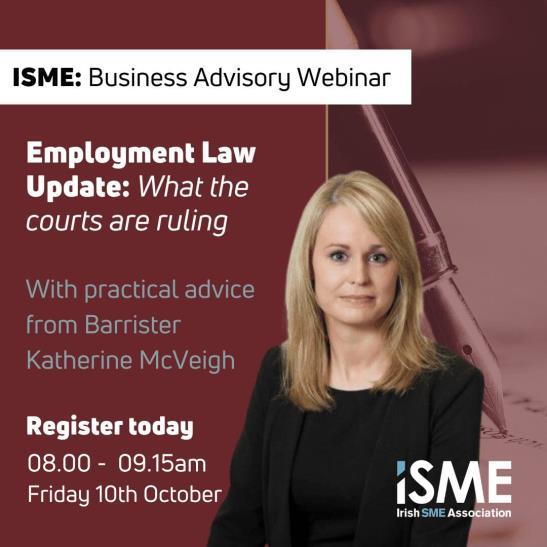
Time & Date: Thursday, 10th October, 08.00 am – 09:15 am

Association calls for more Gardaí, tougher sentencing, and better use of CCTV to deter offenders
Findings from ISME’s Business Crime Survey 2025 reveal that 64% of Irish SMEs were unaffected by crime in the past 12 months, a result that challenges recent public debate about rising crime rates.
Of the 36% of businesses which did experience crime, 68% were targeted more than once. The most common offences were anti-social behaviour (21%), vandalism (19%), burglary (17%) and phishing attacks (15%).
For businesses affected, the costs are considerable: 28% reported increased security costs, 22% faced higher insurance premiums, and 17% had to make expensive physical alterations to premises.
Despite 73% of victims rating Garda performance as adequate or very effective, 78% of all respondents believe the judicial system fails to deter repeat offenders. 85% of SMEs want more Gardaí, 76% support tougher sentencing, and 73% favour increased CCTV coverage and data-sharing.
Click here to know more
SEAI is hosting a FREE & ONLINE Energy Management Training Session in September
Introduction to Energy Management Training will take place on Thursday 4th September from 24pm. This is a free 2 hour workshop which supports SMEs in creating an Energy Action Plan. Further details on the training, as well as relevant workbooks and guides are available on our website here: Energy Efficiency Training for SMEs | Business | SEAI. Businesses can register for the training through our Ticket Tailor site here: Buy tickets – Introduction to Energy Management Training

For any business unable to attend, this training course is run frequently so there will be other sessions available throughout the year.
For any business looking to get started on their Energy Efficiency journey immediately, our Energy Academy is also available which provides free, on-demand training on energy management. SEAI Energy Academy | SEAI

The ISME Finance Finder, developed in partnership with Swoop Funding, is an online platform designed to streamline access to finance for Irish SMEs. It offers a centralized solution for businesses seeking funding options to start, expand, improve cash flow, refinance debt, acquire assets, or invest in new markets. Key features include:
• Comprehensive Funding Options: Access to loans, equity, grants, and asset finance tailored to various business needs.
• Expert Guidance: Support from a team of funding specialists to assist with queries and application processes.
• Application Tools: Provision of templates and resources to facilitate funding applications.
• Dedicated Support: Availability of a hotline and email support five days a week for funding-related inquiries.
• Regular Updates: Finance updates and alerts to keep businesses informed of new opportunities
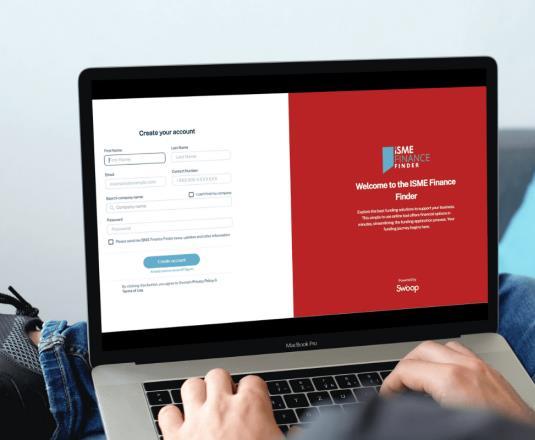
Additionally, businesses can avail of a complimentary 30-minute oneon-one consultation with Swoop's funding experts, offering confidential and obligation-free advice.
For more information or to begin your funding journey, visit the ISME Finance Finder.
ISME is taking bookings now for ads in the 2026 Wall planner
We will be printing and distributing our popular 2026 ISME Wall Planners to the membership before the end of the year. We offer advertising space on the planner, a great B2B tool which will be distributed to all ISME Members nationwide. There are four sizes available for advertising, and as always, ISME Members receive a discounted rate. Book your spot now as they sell fast.
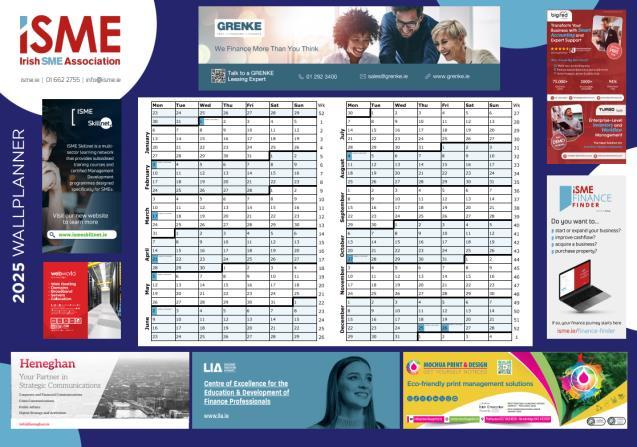
Download the spec here or email marketing@isme.ie for more information

❑ Annual Review of Workplace Injuries, Illnesses and Fatalities 2022–2023 report presents the Annual Review of Workplace Injuries, Illnesses, and Fatalities for 20222023. In preparing this report, we recognise the importance of providing reliable and up-to-date statistical information as an evidence base for decision-making.
❑ A Short Guide to Health Surveillance in the Workplace aims to assist employers and health professionals working on their behalf in understanding their legal requirements regarding health surveillance in the workplace. It also highlights the key elements to consider when implementing a health surveillance programme.
❑ Employing Apprentices: Safety On the Job information sheet is written for people who employ apprentices. It provides a summary overview of how employers should fulfil their duties as an employer and protect apprentices, who may be more at risk of injury and ill health.
❑ Safety On the Job for Apprentices- This information sheet is written for Apprentices. It provides some essential tips to help Apprentices stay safe and healthy as they start their career.
❑ Small Business Start-ups : This short introductory course is suitable if you are starting a small business or have a new business You will learn about the role of the Health and Safety Authority (HSA) and the importance of managing safety, health and welfare in the workplace The elements of a health and safety management system are outlined on the course and the main duties of employers and employees under the Safety, Health and Welfare at Work Act 2005 Risk assessment and meeting Safety Statement requirements for your business is another key part of this course
❑ Small Business – Employees: This short introductory course is suitable for employees that are working in a small business The course outlines the main duties of employers and employees under the Safety, Health and Welfare at Work Act 2005 It also addresses the impact of positive safety behaviour in the workplace The course also includes key health and safety information required to keep you safe at work, including information on the roles of a Safety Officer and Safety Representative
❑ Small Business – Employers: This short introductory course is suitable for employers and the self-employed who are running a small business. The course outlines the role of the Health and Safety Authority (HSA) and the general duties of employers under the Safety, Health and Welfare at Work Act 2005. The content is suitable across all work sectors
In relation to safety management, please see the following:
• Safety Management Made Simple
• Director Responsibilities, Safety Leadership & Safety Culture
In relation to OSH and workplace learning, please see the following:
• OSH Learner Pathway / Journey
• OSH Training Requirements & Approach
• Employee OSH Training Journey
• OSH in Education and Training Providers

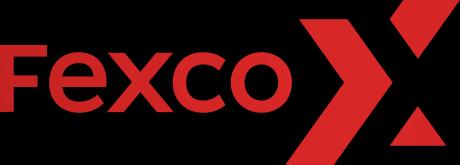
Key events that influenced foreign exchange markets in August
• US Fed chairman Jerome Powell flagged the possibility of the US central bank cutting interest rates at its meeting in September, which following his speech in Wyoming, played negatively for the dollar
• US President Donald Trump's sweeping new tariffs on more than 90 countries around the world came into effect.
• The EU and US released a joint statement outlining the “Framework on an Agreement on Reciprocal, Fair, and Balanced Trade”, providing some clarity on the future trading relationship between the two partners
• Key labour indicator, Nonfarm Payrolls in the United States showed growth of 73,000 jobs for July, below the market estimate for a gain of 100,000 - June and May totals were revised sharply lower by a combined 258,000 from previously announced levels.
• The Bank of England cut interest rates for the fifth time in a year to 4%
What data and factors could impact the major currencies in September?
• Tuesday September 2nd - European core Inflation year on year
• Thursday September 4th – European retail sales year on year
• Friday September 5th – US Non-Farm Payrolls (employment data)
• Thursday September 11th – ECB interest rate decision
• Wednesday September 17th – US Fed interest rate decision
• Thursday September 18th – UK interest rate decision
As an ISME member, you have exclusive access to Fexco’s dedicated account manager John Barry, who will help you with all your foreign exchange requirements.
• Reduce your cross-border payments costs
• Protect your business from currency volatility
Discover the benefits to your business without an obligation to trade!
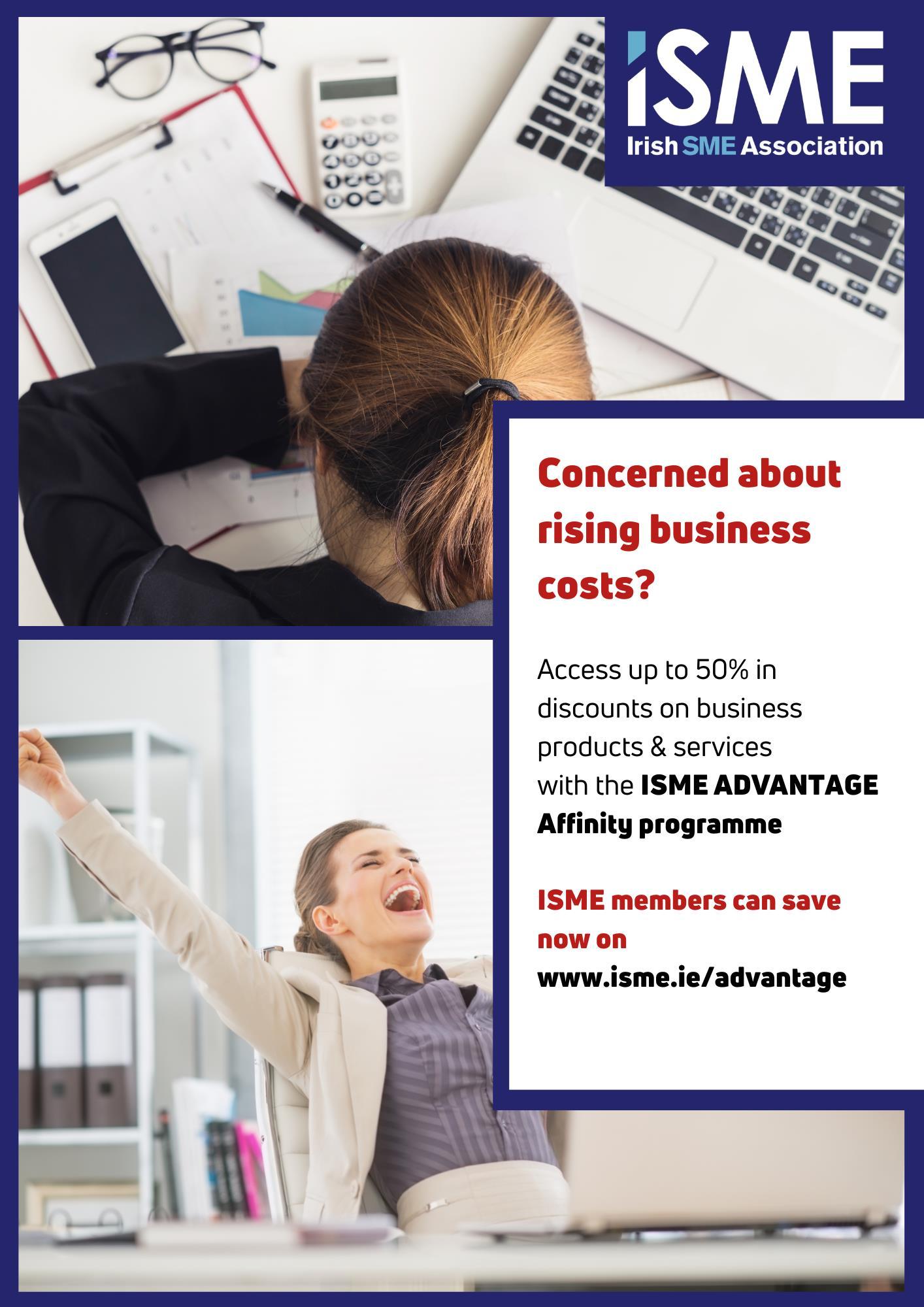

As the Irish labour market becomes increasingly global, hiring non-EEA (European Economic Area) nationals has become a key part of many organisations’ recruitment strategies. However, employing individuals from outside the EEA and Switzerland requires strict compliance with Irish immigration and employment laws notably the Employment Permits system.
The Irish Government, through the Department of Enterprise, Trade and Employment (DETE), issues several types of employment permits. There are nine different work permit options available although the most common are:
• Critical Skills Employment Permit: Designed to attract highly skilled workers in occupations experiencing shortages, such as ICT professionals, engineers, and healthcare workers. This permit is valid for 2 years and can lead to residency without further permits.
• General Employment Permit: Available for occupations not on the Critical Skills list but still requiring a permit. It typically requires a Labour Market Needs Test and is issued for 2 years initially.
• Intra-Company Transfer Permit: For multinational companies transferring employees to their Irish operations on a temporary basis.
Other permits include the Contract for Services Permit, Internship Employment Permit, and the Sport and Cultural Employment Permit.
A work permit is required for most non-EEA nationals who wish to work legally in Ireland, with some exceptions:
• EEA and Swiss citizens do not need a permit.
• Non-EEA spouses or dependants of Irish or EEA nationals may not need one, depending on their status.
• Students on certain visas may work part-time but have limitations.
Employers are legally responsible for ensuring the appropriate permit is in place before employment begins.

Employers must:
• Ensure the role is eligible for a permit. The Ineligible List of Occupations for Employment Permits provides details of what roles in respect of which an employment permit shall not be granted
• Offer terms and conditions that comply with Irish employment law (e.g., pay, hours, leave). Please ensure the same company name is used across all documents submitted as errors will cancel the work permit.
• Keep records of employment permits and renewals.
• Notify the Department if employment ends prematurely.
For General Employment Permits, employers must typically show that they were unable to find a suitable EEA candidate, usually through a Labour Market Needs Test, which involves advertising the job on EURES for at least 28 day days before a valid application can be submitted.
Applications are usually made online through the Employment Permits Online System (EPOS) and can be submitted by either the employer or the employee. Key documents include:
• A copy of the job offer/contract
• Details of the business
• Proof of labour market testing (if required)
• Passport details of the applicant
Processing times vary but typically range from 4 to 8 weeks. Fees depend on the type and duration of the permit (e.g., €1,000 for a two-year General Employment Permit).
Employing someone without a valid permit can lead to:
• Fines and / or legal action up to €250,000 and 10 years' imprisonment
• Reputational damage
• Barriers to future permit approvals
It is essential for Employers to establish a robust immigration compliance process, including regular permit tracking and renewals.

Work permits play a vital role in accessing global talent, but they come with serious responsibilities. A proactive, compliant approach ensures not only legal adherence but also a smoother employee experience. Partnering with legal experts or immigration consultants can further reduce risk and streamline the process.
Additionally, FAQ’s published by the Department of Enterprise, Trade and Employment on work permits can be found here.
As a member of ISME you’ll find further details and resources in relation to work permits on our website at https://isme.ie/members-area/hrhub/recruitment/

The ISME Skillnet service is here to help both the business owner and their employees.
ISME Members can receive up to 40% discount on ISME Skillnet training, view courses below.
Managing Priorities & Achieving More
Wednesday 10th September View Course
Effective Communication & Influencing Skills Programme
Thursday 11th September View Course
Effective Telephone Sales Thursday 18th September View Course
Microsoft Excel Intermediate Wednesday 24th September View Course
LinkedIn for Business Friday, 30th September View Course
MS Excel Advanced Wednesday 8th October View Course
Business Writing & Email Etiquette Tuesday 14th October View Course

